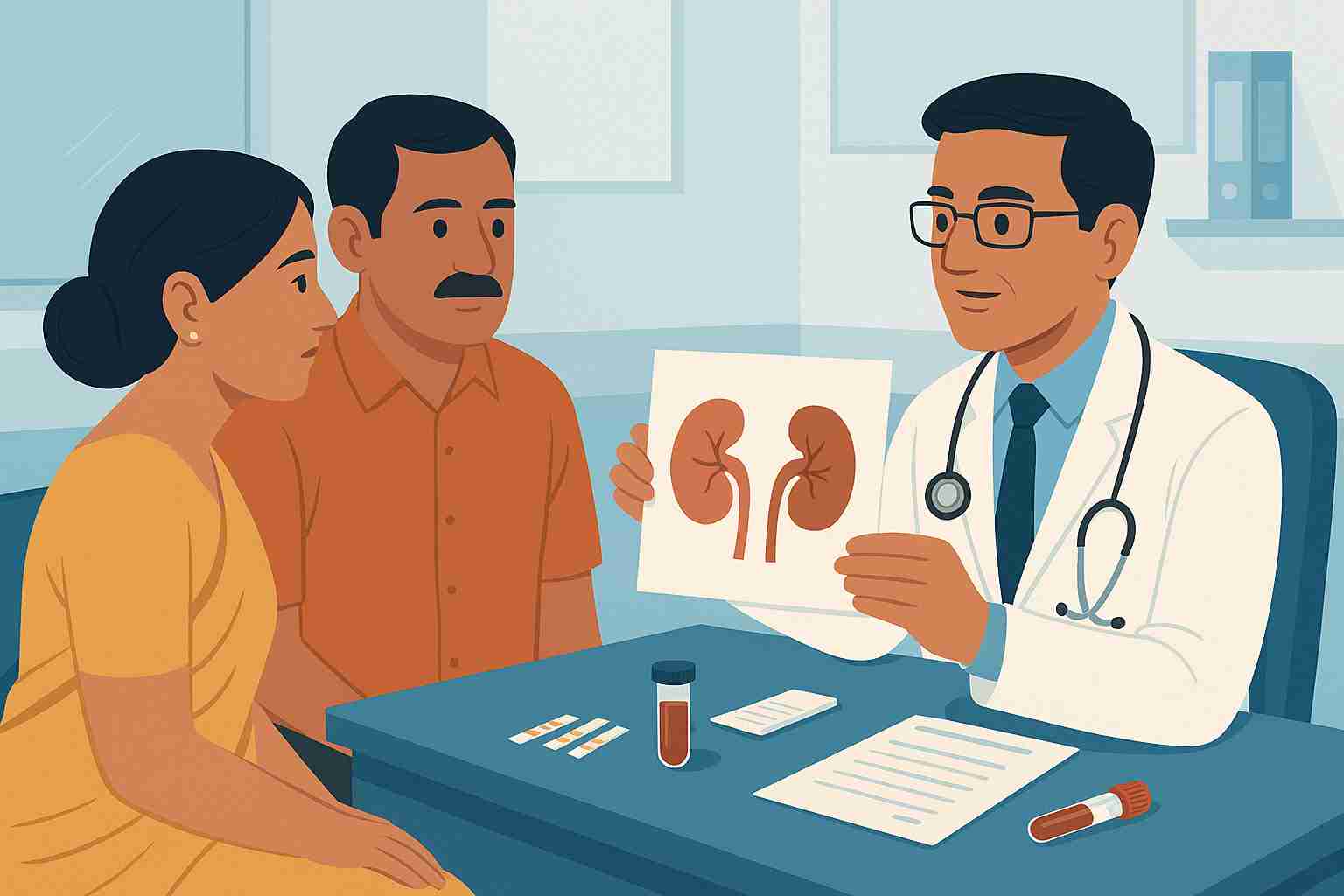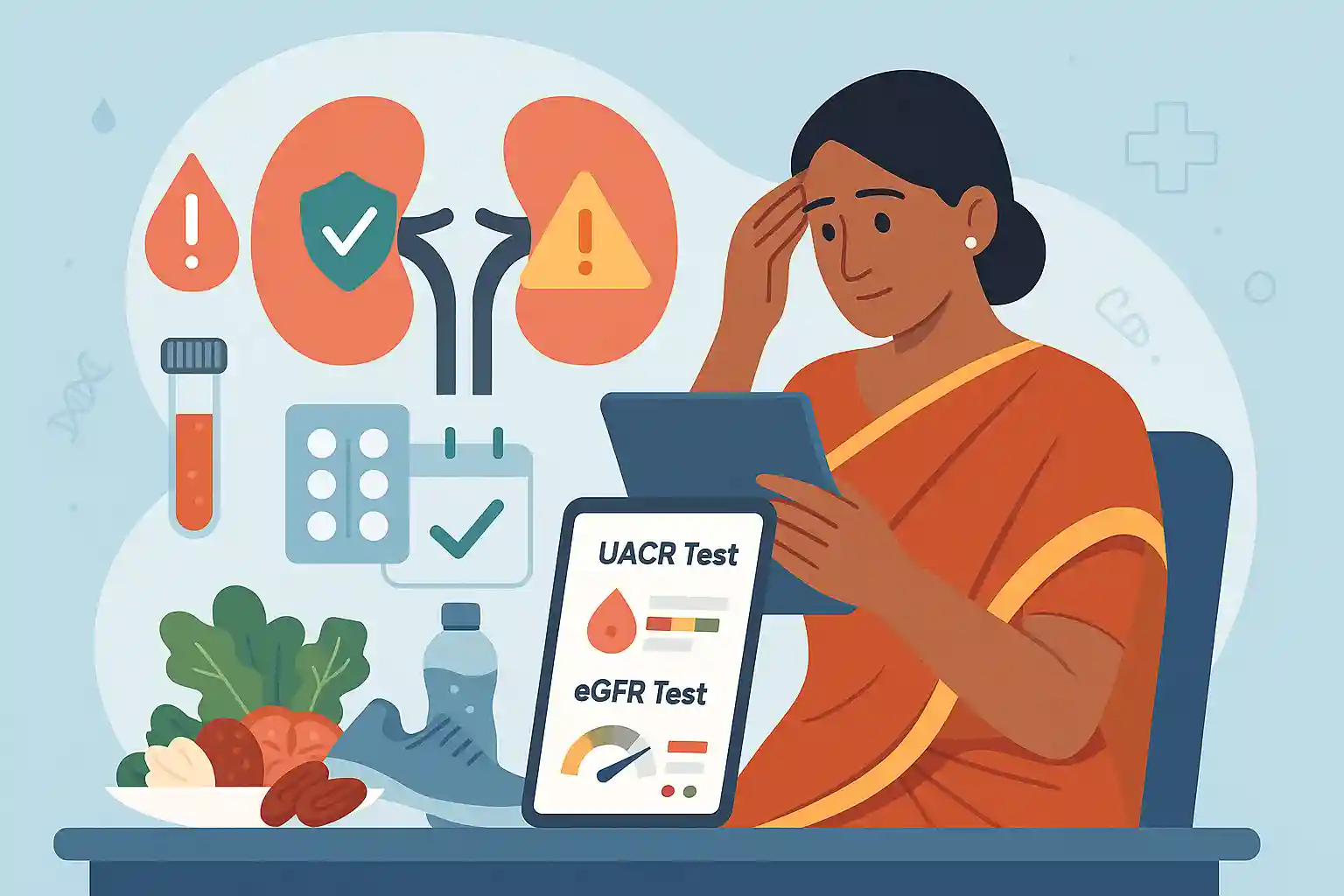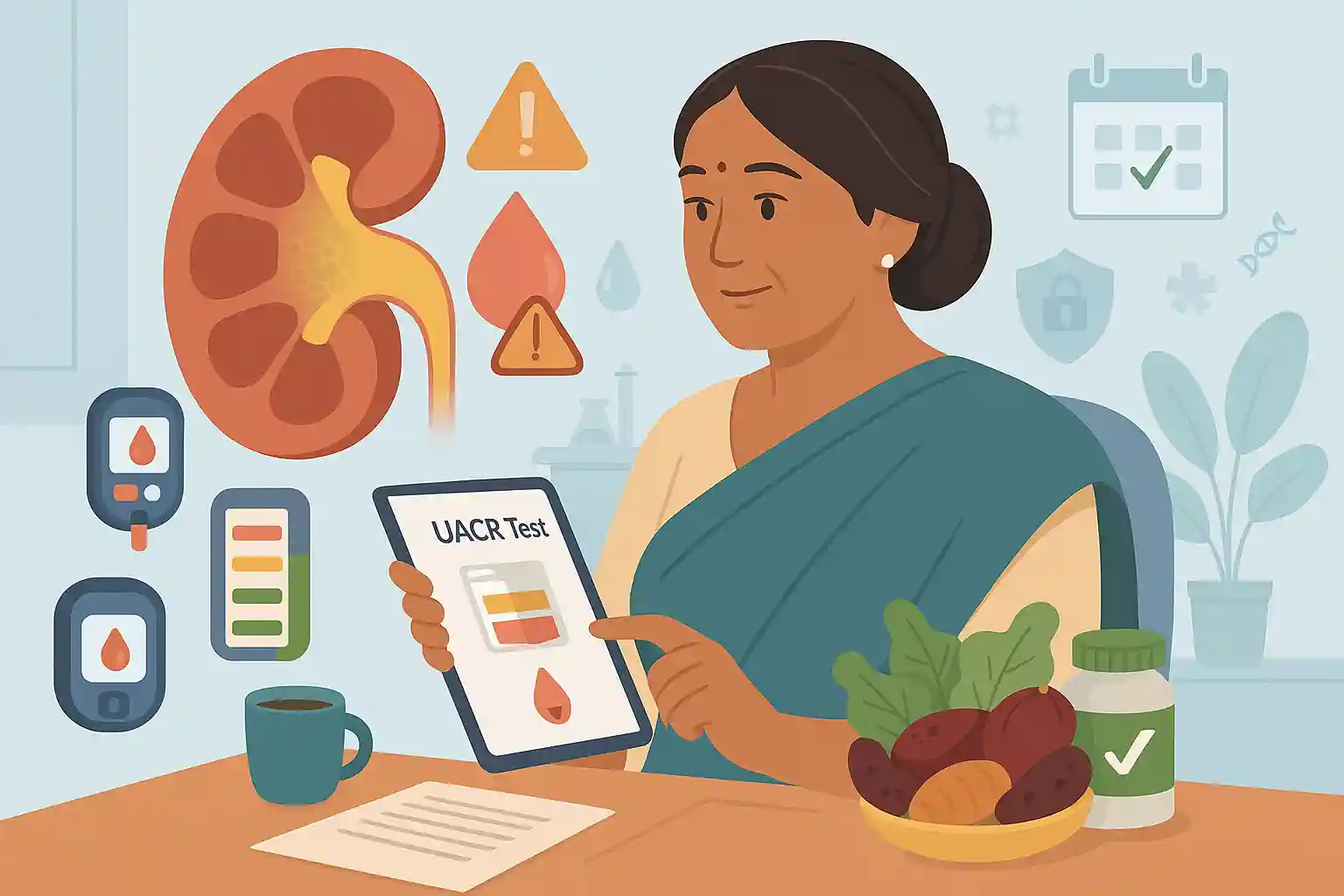Diabetes affects over 77 million Indians, making it one of the world's largest diabetic populations. Among the serious complications of diabetes, kidney disease (diabetic nephropathy) stands out as a leading cause of kidney failure and dialysis dependency. The good news? Early detection through UACR (Urine Albumin-to-Creatinine Ratio) tests can help prevent irreversible kidney damage and save both your health and finances.
If you're diabetic, understanding UACR tests isn't just recommended—it's essential for your long-term health. This comprehensive guide will help you understand everything about UACR testing, interpret your results, and take proactive steps to protect your kidneys.
What is a UACR Test?
UACR (Urine Albumin-to-Creatinine Ratio) is a simple urine test that measures the amount of albumin (a protein) relative to creatinine in your urine. When kidneys are healthy, they prevent albumin from leaking into urine. However, when diabetes damages the kidney's filtering units (nephrons), albumin begins to leak into urine—a condition called albuminuria or proteinuria.
The test is expressed as milligrams of albumin per gram of creatinine (mg/g) and provides a more accurate measurement than simple protein tests because it accounts for urine concentration variations throughout the day.
Understanding UACR Values and What They Mean
UACR values are categorized into different stages that indicate kidney health status:
Normal (Healthy Kidneys):
- UACR less than 30 mg/g
- Indicates normal kidney function
- No significant protein leakage
- Continue preventive measures
Microalbuminuria (Early Kidney Damage):
- UACR 30-300 mg/g
- Early stage of diabetic kidney disease
- Often reversible with proper treatment
- Requires immediate intervention
Macroalbuminuria (Advanced Kidney Damage):
- UACR greater than 300 mg/g
- Significant kidney damage
- Higher risk of kidney failure
- Requires aggressive treatment and specialist care
Why Indian Diabetics Are at Higher Risk
Several factors make Indian diabetics particularly vulnerable to kidney complications:
- Genetic predisposition: South Asians develop diabetes at younger ages and lower BMI
- Poor blood sugar control: Many Indians have HbA1c levels above recommended targets
- High blood pressure prevalence: Often undiagnosed and untreated
- Dietary factors: High salt intake, refined carbohydrates, and processed foods
- Late diagnosis: Diabetes often detected after complications develop
- Inadequate medical follow-up: Many don't get regular kidney function tests
- Socioeconomic factors: Limited access to quality healthcare and medications
When Should You Get a UACR Test?
The American Diabetes Association and Indian guidelines recommend specific testing schedules:
For Type 1 Diabetics:
- Start testing 5 years after diagnosis
- Test annually if results are normal
- More frequent testing if abnormal results
For Type 2 Diabetics:
- Test immediately at diagnosis
- Annual testing if normal
- Every 6 months if microalbuminuria is detected
- Every 3 months if macroalbuminuria is present
Additional Risk Factors Requiring More Frequent Testing:
- Poor blood sugar control (HbA1c > 7%)
- High blood pressure
- Family history of kidney disease
- Duration of diabetes > 10 years
- Smoking
- Age over 40 years
How to Prepare for a UACR Test
Proper preparation ensures accurate results:
Before the Test:
- Avoid vigorous exercise 24 hours before testing
- Don't take the test during menstruation or urinary tract infection
- Inform your doctor about all medications
- Avoid excessive protein intake the night before
- Stay well-hydrated but don't over-drink water
Sample Collection Tips:
- First morning urine sample is preferred
- Clean the genital area before collection
- Collect midstream urine in the provided container
- Ensure the container is clean and sterile
- Submit the sample within 2 hours of collection
Interpreting Your Results: What Action to Take
Based on your UACR results, here's what you should do:
Normal Results (UACR < 30 mg/g):
- Continue current diabetes management
- Maintain good blood sugar control (HbA1c < 7%)
- Keep blood pressure under 130/80 mmHg
- Follow a kidney-friendly diet
- Repeat test annually
Microalbuminuria (UACR 30-300 mg/g):
- Immediate consultation with your doctor
- Aggressive blood sugar control (target HbA1c < 6.5%)
- Blood pressure control with ACE inhibitors or ARBs
- Dietary modifications and weight management
- Test every 6 months
- Consider referral to nephrologist
Macroalbuminuria (UACR > 300 mg/g):
- Urgent nephrology referral
- Comprehensive kidney function assessment
- Aggressive treatment of diabetes and hypertension
- Dietary protein restriction
- Regular monitoring every 3 months
- Preparation for potential kidney replacement therapy
Protecting Your Kidneys: Prevention Strategies
Prevention is always better than treatment. Here are evidence-based strategies:
Blood Sugar Management:
- Target HbA1c below 7% (or as advised by your doctor)
- Monitor blood sugar regularly
- Take medications as prescribed
- Consider continuous glucose monitoring if recommended
- Learn carbohydrate counting
Blood Pressure Control:
- Target blood pressure below 130/80 mmHg
- Take antihypertensive medications regularly
- Reduce sodium intake to less than 2.3g per day
- Monitor blood pressure at home
- Manage stress through yoga or meditation
Dietary Modifications:
- Limit protein intake to 0.8g per kg body weight if kidney damage is present
- Choose plant-based proteins: dal, quinoa, nuts
- Reduce sodium in cooking and avoid processed foods
- Include kidney-friendly foods: berries, fish, olive oil
- Stay hydrated with adequate water intake
Medical Treatment Options
When lifestyle changes aren't enough, medical intervention becomes necessary:
Medications for Kidney Protection:
- ACE inhibitors (Enalapril, Lisinopril): Reduce protein leakage
- ARBs (Losartan, Telmisartan): Alternative to ACE inhibitors
- SGLT2 inhibitors (Empagliflozin): Newer diabetes drugs with kidney benefits
- Diuretics: Help control blood pressure and fluid retention
- Statins: Control cholesterol and provide kidney protection
Advanced Treatment Options:
- Newer medications like GLP-1 agonists for dual diabetes-kidney benefits
- Specialized diets under nutritionist guidance
- Regular monitoring by nephrology team
- Preparation for dialysis or kidney transplant if needed
Cost Considerations and Accessibility in India
Understanding the financial aspects helps in planning your healthcare:
UACR Test Costs:
- Private labs: ₹300-800 per test
- Government hospitals: ₹50-200 per test
- Health packages: Often included in diabetes screening packages
- Insurance coverage: Most health insurance plans cover diagnostic tests
Government Healthcare Support:
- Ayushman Bharat: Covers kidney disease treatment up to ₹5 lakh
- State government schemes: Additional coverage for dialysis and transplant
- Primary Health Centers: Basic testing and treatment facilities
- District hospitals: Free or subsidized specialized care
Common Mistakes to Avoid
Avoid these common errors that can worsen kidney health:
- Ignoring early warning signs and delaying tests
- Self-medicating with pain relievers (NSAIDs) that can damage kidneys
- Discontinuing medications without doctor's advice
- Following extreme diets without medical supervision
- Believing in unproven remedies and delaying proper treatment
- Not monitoring blood sugar and blood pressure regularly
- Smoking and excessive alcohol consumption
Technology and Home Monitoring
Modern technology can help you stay on top of your kidney health:
- Smartphone apps for tracking blood sugar, blood pressure, and medications
- At home uACR test kits for regular monitoring
- Digital blood pressure monitors for daily monitoring
- Continuous glucose monitors for better diabetes control
- Telemedicine consultations for regular follow-ups
Building Your Healthcare Team
Managing diabetic kidney disease requires a team approach:
- Primary care physician: Overall diabetes management and coordination
- Endocrinologist: Specialized diabetes care and medication adjustment
- Nephrologist: Kidney specialist for advanced care
- Dietitian: Nutritional counseling for kidney-friendly diet
- Diabetes educator: Training on self-management skills
- Pharmacist: Medication counseling and interaction checks
When to Seek Emergency Care
Seek immediate medical attention if you experience:
- Sudden swelling in face, hands, or feet
- Difficulty urinating or significant changes in urine color
- Severe nausea, vomiting, or loss of appetite
- Persistent fatigue and weakness
- Shortness of breath or chest pain
- Severe headaches with visual changes
- Blood sugar levels consistently above 300 mg/dL
The Hope for Better Outcomes
While diabetic kidney disease is serious, early detection through UACR testing and proper management can significantly slow or even halt its progression. Many people with early-stage kidney disease live normal, healthy lives by taking control of their diabetes and following their treatment plan consistently.
The key is not to wait for symptoms to appear—kidney disease often progresses silently. Regular UACR testing gives you the power to detect problems early when they're most treatable. Work with your healthcare team to establish a testing schedule that's right for your risk level.
Remember, you're not just managing a test result—you're protecting your future quality of life. Every positive step you take today, from better blood sugar control to regular monitoring, is an investment in your long-term health and independence.
Take charge of your kidney health today. Talk to your doctor about UACR testing, understand your results, and commit to the lifestyle changes that will keep your kidneys healthy for years to come. Your future self will thank you for the proactive steps you take now.



